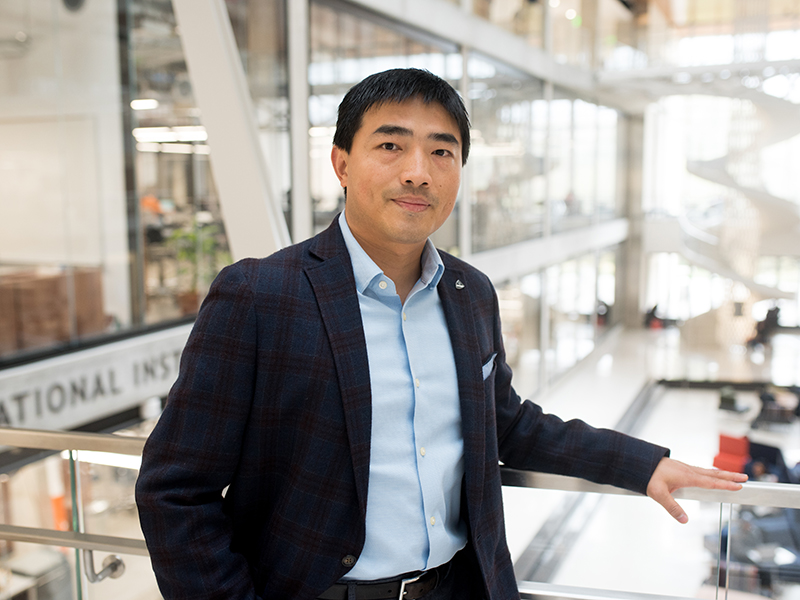A pair of professors from The University of Texas at Austin were selected as finalists for the 2022 Blavatnik National Awards for Young Scientists.
Guihua Yu, a professor of materials science and mechanical engineering in the Cockrell School of Engineering, was chosen as a finalist in the physical science and engineering category. And Jason McLellan, a molecular sciences professor in the College of Natural Sciences, was chosen as a finalist in the chemistry category.

The Blavatnik National Awards for Young Scientists celebrates the past accomplishments and future potential of young faculty members working in life sciences, chemistry and physical sciences and engineering. Winners from each of these three categories will be chosen on June 29. Each winner will receive $250,000 as a Blavatnik National Awards Laureate.
Yu developed hydrogels able to transmit electricity by controlling electron and ion transport. By tuning how the polymer and water molecules interact, the gels demonstrated record-breaking solar evaporation rates as solar steam generators. The hydrogels could have major impacts on real-world problems through applications such as pulling drinkable water out of thin air, purifying river water and enabling self-watering soil.
Yu’s work extends to other important areas, including energy. He developed a room-temperature, liquid-metal battery, which combines many of the best features of solid-state and liquid batteries, while eliminating their major problems. And he led a team that unlocked an important mystery in lithium-ion battery storage.
McLellan studies the structure of viruses and their key proteins, employing a tactic known as structure-based design to the development of vaccines and therapeutics. He is renowned for having stabilized the SARS-CoV-2-spike protein, the part of the coronavirus responsible for infecting cells for use in COVID-19 vaccines, including all of the vaccines approved for use in the United States. Thanks to his efforts, hundreds of millions across the world have been immunized against COVID-19 with vaccines that use his team's spike protein technology.
Earlier in his career, he employed structure-based vaccine design with colleagues at the National Institutes of Health to develop an effective vaccine against respiratory syncytial virus (RSV); final human clinical trials for those vaccines are underway now. McLellan also has developed a second-generation spike protein that is helping low- and middle-income countries manufacture their own low-cost, effective vaccines.
“Since the Blavatnik National Awards were established nine years ago, many of our finalists have made extraordinary discoveries that have led to groundbreaking innovations in their respective fields,” said Len Blavatnik, founder and chairman of Access Industries and head of the Blavatnik Family Foundation. “We are proud to honor their commitment to scientific excellence and celebrate their achievements.”
Other researchers with UT Austin connections have recently received Blavatnik National Awards for Young Scientist recognition. They include last year’s finalists, computer science professors Kristen Grauman and Aditya Akella, and one winner Andrea Alù, a former Cockrell School faculty member, now at the City University of New York.
“There are many prizes for lifetime achievement in science, but there are only a few prizes that honor scientists at this critical crossroads in their careers,” President and CEO of the New York Academy of Sciences Nicholas B. Dirks said. “Why does this matter? It’s at this stage where support and recognition can make a tremendous difference, giving enormous visibility to their research.”
A ceremony will be held on September 19 to recognize the finalists, and its master of ceremonies will be Nobel prize-winning biologist and UT Austin alumnus Michael W. Young.






